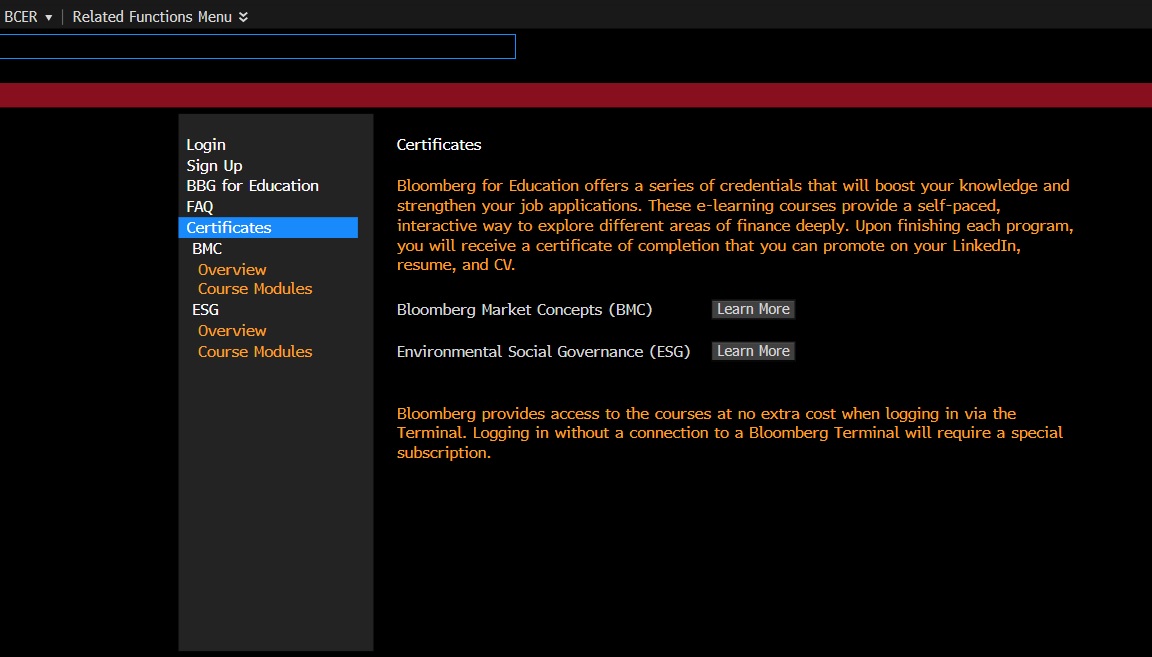Introducing… Bloomberg Market Concepts (BMC)
07/09/2023

If you’re looking for a course that provides an introduction to the global economy and financial markets, then Bloomberg Market Concepts (BMC) might be the answer.
Created by Bloomberg, BMC is an e-learning tool. It is an interactive self-paced certification course delivered through the Bloomberg terminal. The course content utilises Bloomberg data, news and analytics to teach financial concepts. It consists of a library of courses enabling you to learn more about the financial markets, and Bloomberg.
The Core Concepts course has 4 modules (takes approx. 8 hours) which cover the following areas:
- Economic Indicators
- Currencies
- Fixed Income
- Equities
There are also further modules which you can take:
Terminal Basics (approx. 2 hours) explains the Bloomberg terminal functionality including the keyboard, command line, tabs, menus and autocomplete to help navigate the platform and find the data. It also covers screening for stocks and bonds and downloading data to Excel. [Highly recommend to complete if you are going to be using the Bloomberg terminal as a tool for your assignments and data collection for a thesis].
Commodities (approx 1.5 – 2 hours) introduces the background to the market, key players and how trades are made.
Equity Options (approx 1.5 – 2 hours) explains the Stock Options market and the language that is used and how trades work in this market.
Portfolio Management (approx. 2 hours) explains how to create a portfolio, learn how to invest in your portfolio and use tools to analyse the performance of your portfolio. [Please note: no live trading is possible on Bloomberg academic subscriptions].
After successful completion of the Core Concepts modules of BMC [identified by a blue badge ![]() ], you will receive a certificate of completion which is available to download and include on your CV or attach to your LinkedIn profile.
], you will receive a certificate of completion which is available to download and include on your CV or attach to your LinkedIn profile.
To get started on the BMC, you need to login to Bloomberg’s Certification pages. Simply type BCER <GO> into the terminal to open the Bloomberg for Education Certification menu. First you will need to create a separate login by signing up for the e-learning courses. You can then login and access the BMC modules as described above in addition to Bloomberg’s ESG certification course. Please bring your own headphones as there is video material included.

Remember to book your Bloomberg terminal in advance. More information – and how to book – is available on our webpages. Remember to bring your own headphones. Bluetooth headset users should bring their dongle too!
If you have any questions about BMC or the BCER, then please contact the Library.
Categories & Tags:
Leave a comment on this post:
You might also like…
Company codes – CUSIP, SEDOL, ISIN…. What do they mean and how can you use them in our Library resources?
As you use our many finance resources, you will probably notice unique company identifiers which may be codes or symbols. It is worth spending some time getting to know what these are and which resources ...
Supporting careers in defence through specialist education
As a materials engineer by background, I have always been drawn to fields where technical expertise directly shapes real‑world outcomes. Few sectors exemplify this better than defence. Engineering careers in defence sit at the ...
What being a woman in STEM means to me
STEM is both a way of thinking and a practical toolkit. It sharpens reasoning and equips us to turn ideas into solutions with measurable impact. For me, STEM has never been only about acquiring ...
A woman’s experience in environmental science within defence
When I stepped into the gates of the Defence Academy it was the 30th September 2019. I did not know at the time that this would be the beginning of a long journey as ...
Working on your group project? We can help!
When undertaking a group project, typically you'll need to investigate a topic, decide on a methodology for your investigation, gather and collate information and data, share your findings with each other, and then formally report ...
From passion to purpose: My journey at the Pinnacle of Aviation
By: Sultana Yassin Abdi MSc Air Transport Management, Current Student Born and raised in the vibrant landscape of the UAE, with roots stretching back to Somalia, my life has always been ...






